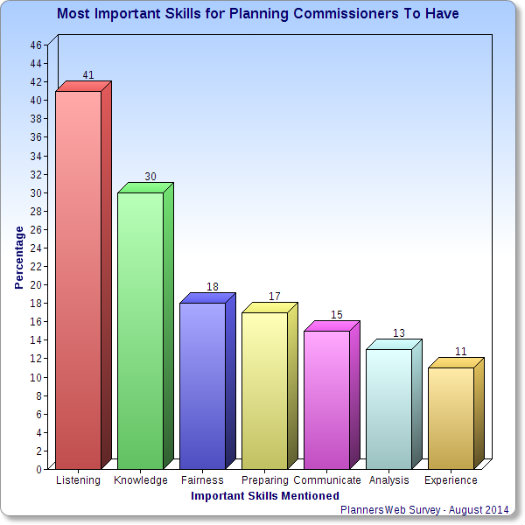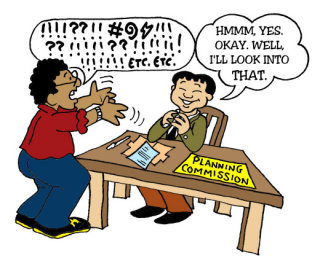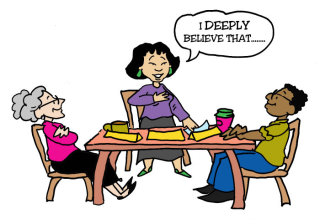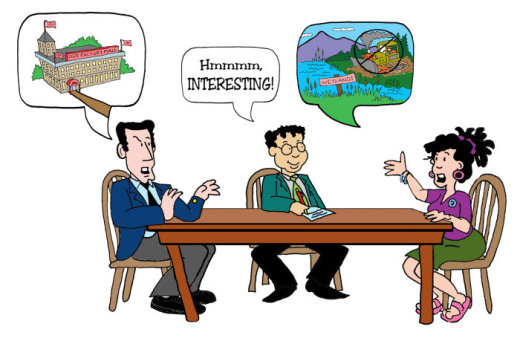Summary:
For nearly 25 years our primary audience has been members of local planning commissions across the country. One of the key questions we asked planning commissioners (current and former) in our survey was this:
What are the skills you’ve found most important in serving on a planning commission? Feel free to provide up to 3 responses.
After reading through the responses we received from 181 planning commissioners, we found that many could be grouped into the following categories:
1. Listening. The skill of listening to what others have to say was the most often cited skill, mentioned by 75 planning commissioners (41 percent of the total).
2. Having Knowledge or Understanding of Community Issues or Ordinances. Comments by 53 planning commissioners spoke to the importance of having knowledge or understanding of issues facing the community, or of local ordinances and laws.
3. Being Fair & Open-Minded. These characteristics were mentioned by 33 commissioners as being important in serving on a planning board.
4. Being Prepared. The importance of being well-prepared for commission meetings was mentioned by 30 individuals as an important skill.
5. Ability to Communicate. Public speaking and the ability to communicate well were cited by 27 of those replying to our question.
6. Analytic Ability. Some 24 commissioners highlighted some aspect of analytic ability as an important skill.
7. Relevant Experience. Having relevant experience or background was mentioned by 20 people.

Details on What We Heard:
1. Listening
Be a good listener.
Listening was mentioned as an important skill in serving on a planning commission by 75 of the 181 planning commissioners (41 percent) who responded to this question.
 Almost all replies were very short, with many just using the word “listen” or “listening,” or similar short phrases such as: “Be a good listener,” “Listening closely to all speakers,” “Active listening.”
Almost all replies were very short, with many just using the word “listen” or “listening,” or similar short phrases such as: “Be a good listener,” “Listening closely to all speakers,” “Active listening.”
Some added a bit more explanation. A planning commissioner from Pennsylvania, for example, mentioned the “ability to listen to ideas, compare it with my past work experience, and then formulate my own opinion,” while a South Carolina planning commissioner described the skill as the “ability to listen and understand different perspectives.”
Listening, for a planning commissioner from Colorado, meant “Checking in with the community to represent them well.”
Finally, a respondent from Kentucky listed as the three most important skills: “Ability to listen; ability to learn; and ability to take action.”
2. Having Knowledge or Understanding of Community Issues or Ordinances / Training
Comments by 53 individuals (29% of those responding to the question) spoke to the importance of having knowledge or understanding of issues facing the community, or of local ordinances and laws. We also grouped in this category seven comments that mentioned the value of enrolling in training or educational programs.
 A sampling of the comments we included in this category:”Knowledge of the ordinances and laws.”
A sampling of the comments we included in this category:”Knowledge of the ordinances and laws.”
- “Knowledge of planning successes/failures in other communities.”
- “Understand the zoning ordinance in the decision making process.”
- “Get familiar with the legal principles behind planning.”
- “Attend workshops/seminars to stay informed.”
- “Have an understanding of the planning process.”
3. Being Fair & Open-Minded
Fairness and being impartial and open-minded were frequently mentioned in comments, being noted by 33 of the 181 commissioners replying to our question.
Typical of the comments we included in this category:
- “Be open to differing opinions.”
- “Being fair minded and impartial.”
- “No pre-conceived agenda/attitude.”
- “Ability to listen to both sides of testimony and make a fair decision.”
- “Maintain independent, objective stance.”
Two comments worth noting: a Vermont planning commissioner wrote: “Be open minded, courteous and modest — don’t assume you know everything and accept that you can learn from someone who holds a different view than you,” while a California commissioner listed as an important skill, “Sensitivity to both community members and applicants (developers) while maintaining standards.”
4. Being Prepared
The importance of being well-prepared for commission meetings was mentioned by 30 individuals as a valuable skill for planning commissioners to have. While these comments overlap slightly with comments about having knowledge or training (mentioned above), we found them sufficiently distinct to group separately.
Visit the sites to be discussed whenever possible.
Most all of these comments were short and to the point, such as:
- “Adequate meeting preparation to understand issues.”
- “Do your homework.”
- “Willing to read and learn details for the meetings.”
- “Review agenda before meeting.”
- “Visit the sites to be discussed whenever possible.”
5. Ability to Communicate
Public speaking and the ability to communicate well were cited by 27 individuals as one of the three most important skills for planning commissioners to have.
Among the replies we grouped in this category:
- “Excellent communication skills.”
- “Ability to communicate clearly in a meeting environment.”
- “Public speaking.”
- “Communicate precisely.”
- “Articulate speaking.”
6. Analytic Ability
24 individuals highlighted some aspect of analytic ability as an important skill.
While a number of responses were short, such as “analytical ability,” “evaluate information,” “rational analysis,” “critical thinking,” “sorting out what is meaningful,” others were a bit longer:
Understanding the long-term impact of development decisions and avoiding unintended consequences.
A Michigan planning board member, for example, listed as an important skill, “Trying to look at issues from what is best for the city and is logical,” while a planning commissioner member from California cited the “ability to comprehend complex matters and balance competing interests.”
Several comments which we also grouped under “analytic ability” were similar to those of another California planning commissioner who wrote of the importance of: “Understanding the long-term impact of development decisions and avoiding unintended consequences.”
7. Relevant Experience
Having relevant experience or background was listed by 20 individuals as an important skill for planning commissioners.
A sampling from these replies:
- “I’ve been a real estate broker for 40 years.”
- “Legal training.”
- “Experience in drafting regulations.”
- “I am the first architect to have ever served on our planning commission. I am able to help other commissioners perceive the physical impact of a project.”
- “Knowledge and personal experience with building and re-modeling.”
- “As a professional land planner and urban designer, my background helped a lot.”
Regarding that last comment, we found it interested to see that quite a few of the planning commissioners responding to our survey also serve (or have served) as professional planners — presumably in most cases in different communities. Of the 202 individuals who completed our questionnaire and said they serve (or have served) on a planning commission or zoning board, 55 — 27 percent — also said they work (or have worked) as professional planners.
Editor’s Note: In past years, we’ve featured articles offering tips from individuals who have served in both capacities. See both “Planner and Commissioner” and “Sitting on Both Sides of the Table.”
Other Comments
There were three other smaller clusters of responses:
— We received comments from 13 individuals mentioning the importance of patience.
— Nine individuals mentioned as one of three most important “skills” showing respect to the public.
— Nine others noted the importance of commissioners asking good, cogent questions.
We also received a number of comments touching on a broad variety of other skills or attributes of planning commissioners. Among them:
- “Using common sense.”
- “People skills.”
- “Political savvy.”
- “Learning to compromise.”
- “Not taking anything personally.”
- “Try to build consensus.”
- “Keeping a cool head.”
- “Leadership.”
- “Humility.”
- “Observation.”
- “Ability to make a decision.”
There was also this reminder from a North Carolina planning commissioner (applicable, we would guess, in many situations): “Shut up when you’re winning.”
The ability to work as a “team member” on all issues we deal with.
A Connecticut planning board member listed as an important skill, “the ability to work as a ‘team member’ on all issues we deal with,” while a planning commissioner from Michigan listed as a key skill “learning not to roll my eyes.”
An interesting skill noted by a Massachusetts zoning board member is “questioning unquestioned practices,” while an important attribute described by a Tennessee planning commissioner is “the ability to accept and support majority decisions.”
 Two planning commissioners, one from Wyoming, the other from California, respectively responded: “Courage to say the truth and stand on your principles respectfully,” and “Personal integrity is utmost.”
Two planning commissioners, one from Wyoming, the other from California, respectively responded: “Courage to say the truth and stand on your principles respectfully,” and “Personal integrity is utmost.”
But we’ll leave the final word with a Washington State planning commissioner who said that the skills planning commissioners need are “the same skills that make for good parenting.” You can decide what that implies!
Later this Week, Our Next Post: Most Important Skills for Staff Planners to Have

